.
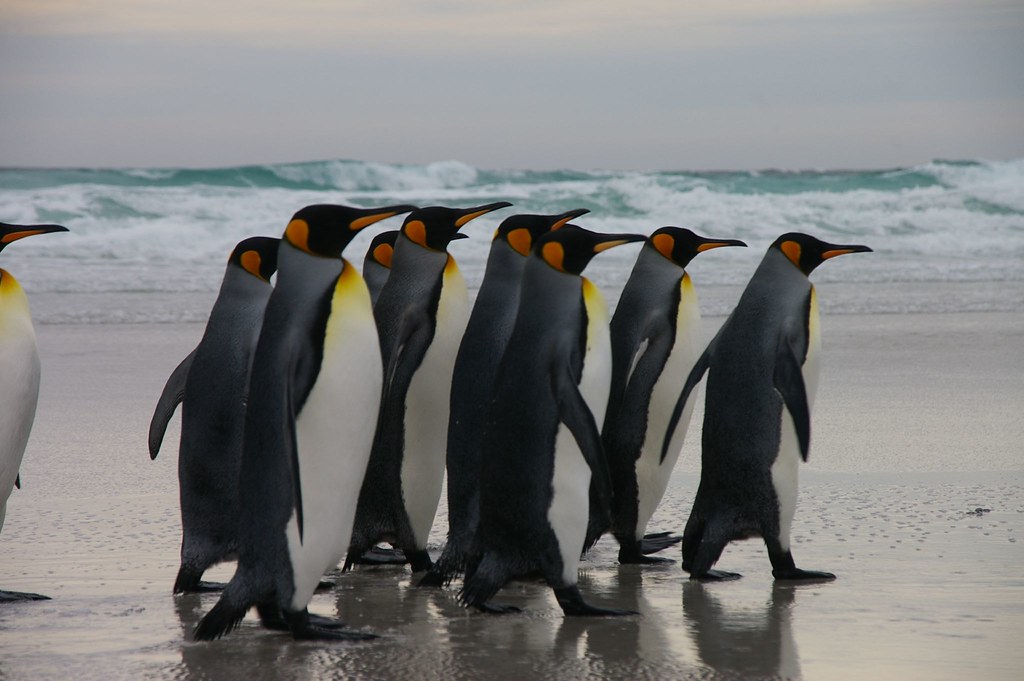
"Even Sarah De Angelo looked like a penguin in black slacks": King Penguins (Aptenoydes patagonicus patagonicus), Stanley, East Falkland Island: photo by Ben Tubby, 18 March 2007
I’ve heard people argue that there’s an awful kind of poem
called an MFA poem, and usually these people
called an MFA poem, and usually these people
who hate MFA poems have never earned an MFA,
so the MFA poets argue vehemently in defense
of their craft and their MFAs, and I, an MFA poet
try to agree and say, I’m on the MFA’s team.
We’re right and they’re wrong. Nah-nah-nah-nah-nah.
But the truth is, well,
there is a certain kind of poem I was taught to write
there is a certain kind of poem I was taught to write
when I was earning what my husband calls my mail-order degree
from a low-res program in the Northeast. And I guess
I would call this kind of poem an MFA poem,
though the truth is, I never learned to write one very well
(though this is one of them, or is trying to be),
but I do see them everywhere now, these MFA poems,
which I despise, not because the poems are bad
but because I was taught how to write them
by this asshole professor (he was such a creep)
who was abusive to women, mostly,
fucked with their heads if not their bodies,
you know the type. Back then
the women took whatever he dished out
because he was famous I guess.
I hated that, and how he would write poems
about being an asshole, which he was and is,
and about everything and anything else
because, he would explain, everything is happening at once,
so everything is happening in his poems, and happening so fast,
that the past, present, and future are all there in the poems
though nothing is ever really happening
because the poems are usually in some static place
like an airplane seat, where he is safely buckled in,
like an airplane seat, where he is safely buckled in,
or a dream, or a therapist's office or a hospital room . . .
He was so often in hospital rooms
because he had just had an appendectomy
or a case of gout or a kidney stone
or gangrene or hemorrhoids or who knows what else,
hypochondria maybe, and usually there was a TV on
(this is America, after all, and everything
is always happening on TV, he said),
and so the I of the poem is always watching
scenes of violence and destruction from far away
while obsessing about himself
and thinking of what the I really wants
which is usually pretty predictable:
a shower, a cup of Starbucks,
a few martinis, a really good fuck.
Yes, he smirked, a good fuck is always nice,
and it’s nice to fuck or use the word, fuck,
in a poem as often as possible
while on TV people are drowning in the mud
at the Grande Island at Angra dos Reis
or being tortured, bombed, or raped in South Waziristan
or maybe in the Democratic Republic of the Congo,
or they are being massacred in Conakry, Guinea
or dumped into mass graves in the southern Mexican state of Guerrero . . .
and somehow the poet usually picks which crisis
to write about, depending on the sound of the name
of the place. The poet likes the name of the city of Sarajevo,
for example, because it sounds like music on his tongue
and reminds him of his first love, Sarah De Angelo.
Yes, Sarah De Angelo. He says her name aloud
as he wonders whatever happened to the lovely Sarah De Angelo
whose name still feels like an ache in his gut,
whose name still fills him with longing and angst,
even now so many years later, even in this hospital room
with horrible scenes of death and disaster playing over and over again,
he thinks only of Sarah De Angelo, and he remembers
he thinks only of Sarah De Angelo, and he remembers
the first time he saw her. He was eleven years old
and new at Saint Charles School in Toledo, Ohio,
and she was wearing a pink frock, pink socks,
and pink ribbons in her yellow hair. Yes, frock,
he thinks, now that's a word no one uses much
anymore. Maybe the poem should include
a few more words like that, like slacks perhaps.
Slacks aren’t nearly as nice as a good frock, of course.
But maybe the poet remembers when the girls
were first allowed to wear slacks to school . . .
and there was that distinction, carefully explained
in the dress code manual, between pants and slacks,
between trousers and slacks,
and as far as he was concerned, slacks
were a big mistake. No one should ever be allowed
to wear slacks, those polyester twills
that made the girls look shapeless and manly . . .
Even Sarah De Angelo looked like a penguin in black slacks.
And at some point (who knows when, but it was never soon enough)
And at some point (who knows when, but it was never soon enough)
the poet realizes that his poem is getting a bit too long,
and he also notices that the nurse on night duty is wearing slacks
beneath her white gown, and he can't help thinking
of Sarah in a silk white blouse with ruffles and black slacks,
and how he wouldn’t mind if the nurse would linger
a while longer and maybe ask him how he feels for once,
and pretend she gives a fuck about him,
and he then begins to wonder what it would be like
to release the nurse from those double knits.
Maybe he could do her a favor or two,
make her smile, laugh, sigh . . .
but when she rolls her little tray up to his bedside
and hands him a pink pill and a plastic cup, she just says, Take this,
and he does. Yes, he takes whatever she gives.
Nin Andrews: Learning to Write the MFA Poem, from The Secret Life of Mannequins, Kattywompus Press, 2011
and he does. Yes, he takes whatever she gives.
Nin Andrews: Learning to Write the MFA Poem, from The Secret Life of Mannequins, Kattywompus Press, 2011
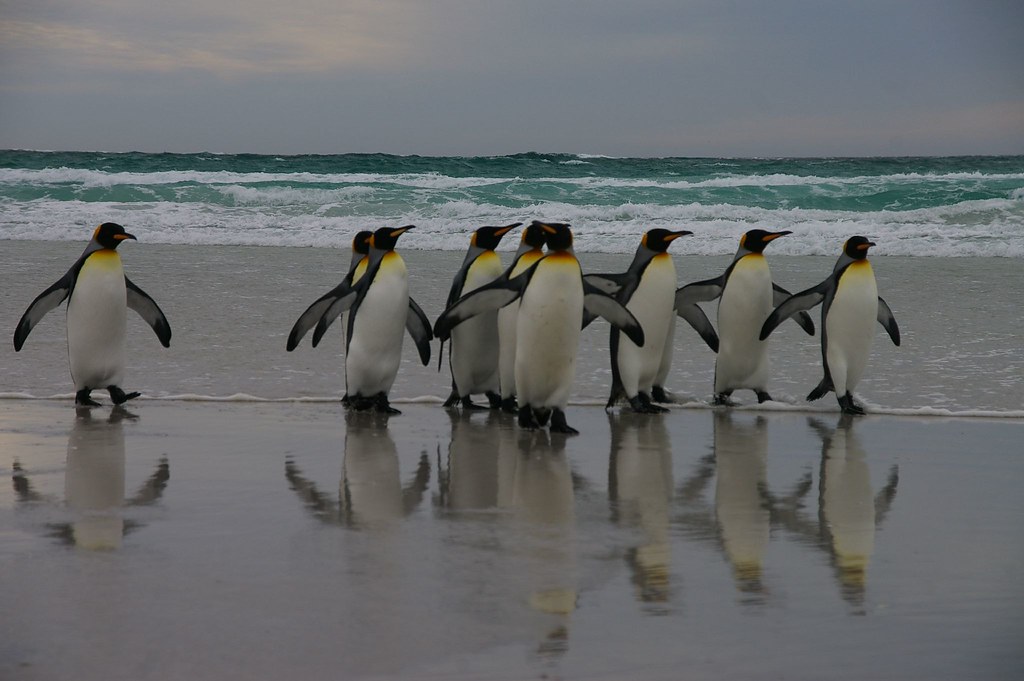
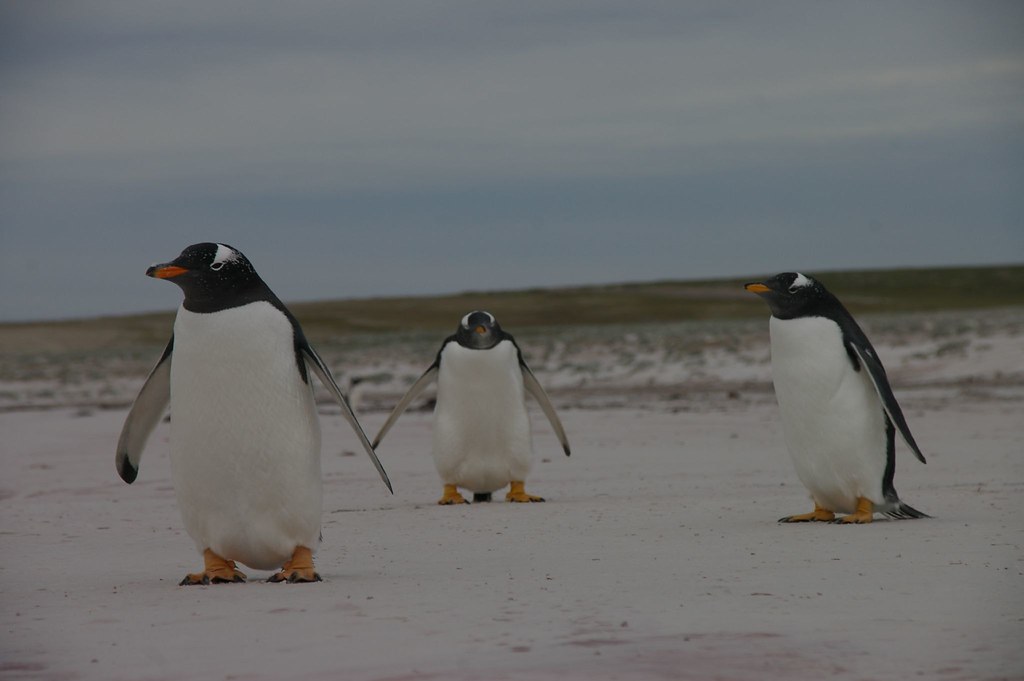
King Penguins (Aptenoydes patagonicus patagonicus), Stanley, East Falkland Island: photo by Ben Tubby, 18 March 2007
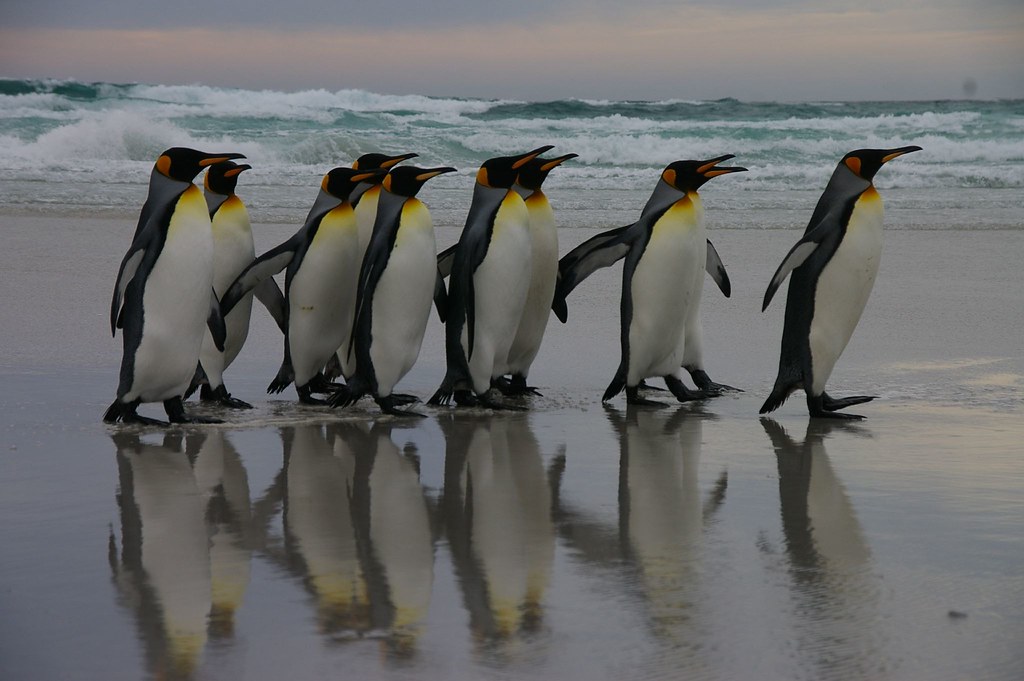
King Penguins (Aptenoydes patagonicus patagonicus), Stanley, East Falkland Island: photo by Ben Tubby, 18 March 2007
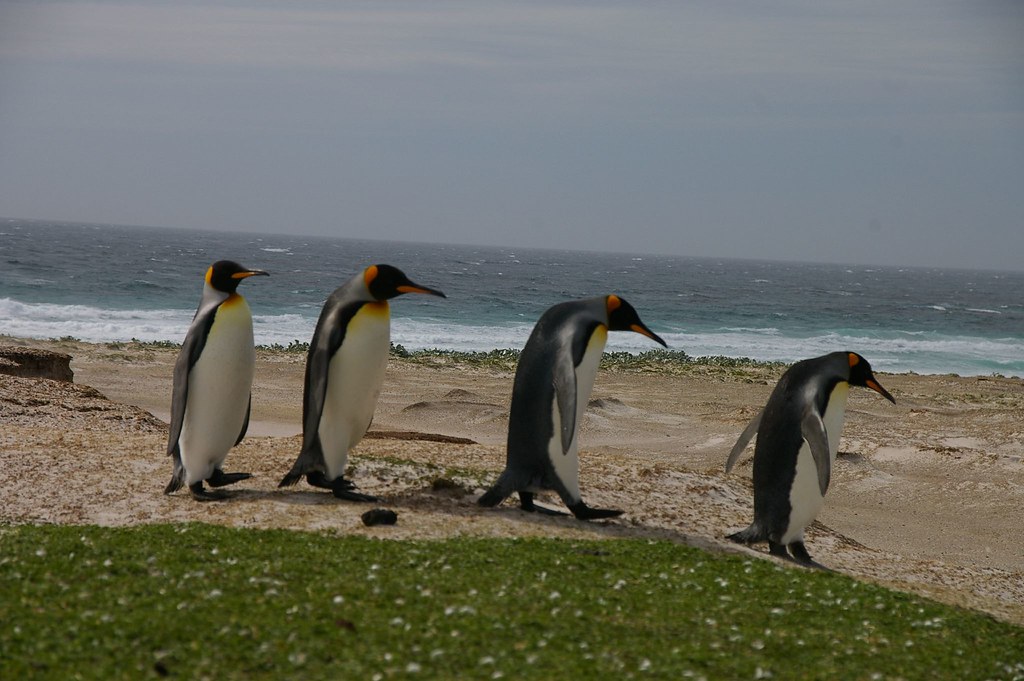
King Penguins (Aptenoydes patagonicus patagonicus), Stanley, East Falkland Island: photo by Ben Tubby, 18 March 2007
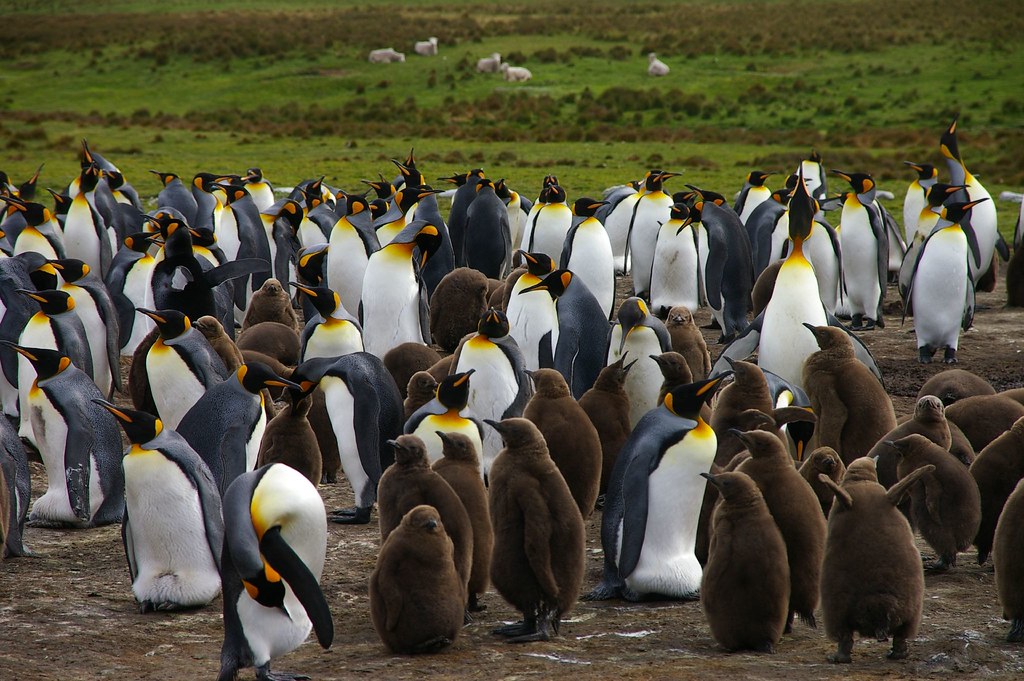
King Penguins (Aptenoydes patagonicus patagonicus), Stanley, East Falkland Island: photo by Ben Tubby, 18 March 2007
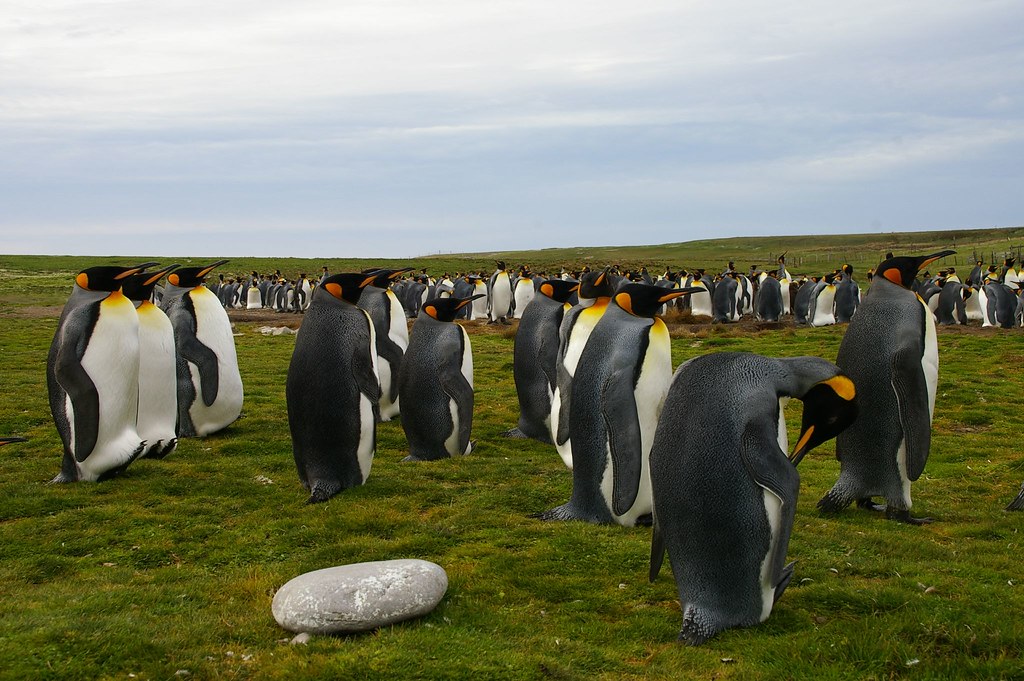
King Penguins (Aptenoydes patagonicus patagonicus), Stanley, East Falkland Island: photo by Ben Tubby, 18 March 2007



16 comments:
Brilliant congruences today, Tom!
Bravo!
Conrad said it well; this is splendid. I really love the poem's transitions and the physical/mental way they affect me. Curtis
A portrait of the artist . . . A great, funny/sad poem.
After their long and arduous degree-seeking travails, at the end of the quest the penguins seem pretty nonchalant about their stone MFA, lying there cold, grey and unnoticed. So it comes to this.
There is so much poured into and pouring from Nin's poem I'm quite at a loss. It feels epic in its scope, insofar as it depicts and enacts the poem as a kind of life -- with the good taking up residence amidst the awful, the violently cruel alongside the gracefully lyric -- and ends, dare I say it, perfectly.
Tom (and Nin),
Go Penguins!
5.29
horizontal line of light in fog against
top of ridge, crow flapping to the left
in foreground, no wave sound in channel
equation in which the place
denotes, depends upon
differentiation, line which
can be formed, simple
silver circle of sun in fog above ridge,
shadowed pine branch on tip of sandspit
Brilliant, right down to the workshop-friendly comments.
Is this the mystery professor?
Another misappropriation of penguins
I would take part in a writing workshop in which all the other participants were penguins. Yes, yes, I would. But I might not take their suggestions.
It is easy to lose yourself in the fervor of the workshop. What a great poem about the greatly frustrating production. Ha, ha, that is a big stone, just as surreal as these flightless birds who do fly so well in water. I remember Ed saying that Charles Olson was a walking workshop. I guess this was a good thing. I like how Nin's poem follows Mr. Beckett's words. She is among the greats in her quest to tumble things around. Ha, ha, I love the brutal honesty here. Ah, Nin, would you consider changing, well, nothing, here?
I don’t know about anybody else out there but after this devastating read, I feel like the penguin off to the right of the stone in the last photo.
I guess the only difference between us and the Emperor Penguins is that the impending doom which faces both species was precipitated by only one, is denied for base reasons (just needing to jump in the car and pick up something at Safeway) by only one, and serves only one right.
They are so much more beautiful, how dare we, I thought to myself tonight, having dragged my woesome head wound out into the night, at the only time I do not fear being run over again -- and encountered a beauteous adult doe, who was nibbling, with due trepidation, upon a bush... when, lo, a car raced by, and we both froze and went into hiding.
William is right, there is a category shift problem, a misappropriation of penguins, going on here.
No penguin would ever mistake a cold useless stone thing like an MFA for something desirable.
For any pedestrians out there brave enough to look about, please see also:
Where Am I? (The Lost Emperor) 6/24/11
Breaking the Ice 6/21/10
Nin Andrews Poetry Comics: guru penguin's lecture 1/30/11
Nin Andrews Poetry Comics: a first post for a week of climate change comics 3/25/12
Nin Andrews Poetry Comics: another climate change comic 3/29/12
Though Latterday Saint Mitt has reassured us there's not a chance
Climate Change could ever penetrate our Sacred Underpants
Here in the bone chilling cold fog of Nome
We keep wondering if that Lost Emperor ever made it home
Found this poem via D Lehman's FB. Neat trick to send up a style and simultaneously transcend the style. To attempt to be in a style that hates itself without being terrible. Is the poet complicit in also wanting her Starbucks and a good fuck while the world burns? I know I am complicit and fully appreciate being called out by the poet, though maybe it is a bit two sided. And MFA's ain't so bad, depends on who you get. Maybe you got Tom? (har har). Also good to see a Yackulic poem here! He has so few of these little contraptions that it is a treat to see another.
Anger is an energy. I could be wrong. I could be right.
d scribe-
I think the point here was the chasm between the sanctioned poetic topics (war, suffering, poverty, injustice) and the actual poetic topics (going to Starbucks, getting fucked), and how the students to be educated must actually believe they are one and the same.
I have never been so glad I never got an MFA. Though I've written poetry for 50 years, it actually makes me question that whole enterprise as well. This so-called professor sounds like an entirely useless human being. But I do like the penguins, though agree they are misappropriated.
Post a Comment